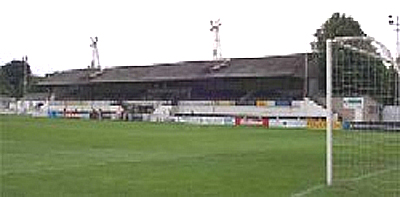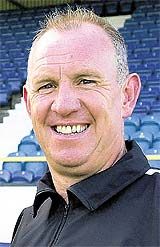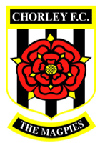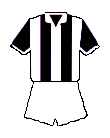Victory
Park
Duke Street,
Chorley,
Lancashire
PR7 3DU
Tel: 01257 263406
www.chorleyfc.com/
Founded: 1875
Nick-name:
The Magpies
County affiliation: Lancashire
County FA

Tony Hesketh



Since those early days the Magpies, as Chorley are nicknamed from their long-standing colours of black and white stripes, have played at four different venues, but have been at Victory Park now for over 80 years.
The original home of Chorley was right in the centre of the town on Dole Lane. In 1901 the club moved to the Rangletts Recreation Ground, which was next to the site of an old ash tip.
Four years later the now nomadic Magpies were again in the move, this time to St George's Park, the then home of long-defunct town rivals Chorley St. George’s.
The final move came when the club purchased the land of the old ash tip next to their former Rangletts home in 1919 for the princely sum of £868 and named it Victory Park to commemorate the end of the First World War. After some preparation work on the site the ground was opened in 1920.
Disaster struck the club in November 1945 when the wooden main stand was destroyed by fire shortly after a crowd of over 4,000 had watched the Magpies beat Football League club Accrington Stanley in the first leg of an FA Cup first-round tie.
Over the years Chorley have competed in several league competitions, these being the Lancashire Alliance, the Lancashire League, the Lancashire Combination, the Cheshire County League, the Northern Premier League and the GM Vauxhall Conference.
The club's first championship success was in 1892/93 when they won the Alliance title, and Chorley have been among the honours many times since, including 11 Combination titles, two Lancashire League championships and one Northern Premier League title, as well as a competition record 14 Lancashire Junior Cup/Lancashire FA Challenge Trophy successes.
In 1968 Chorley were among the founder members of the Northern Premier League but were relegated back into the Lancashire Combination the following year. They returned to the NPL a year later but after two seasons back in the top flight the club decided for financial reasons to step down, this time moving into the Cheshire League.
Although they were a leading club at this lower level, the Cheshire League championship always eluded the Magpies and after finishing runners-up in 1981/82 for the third time the Magpies were elected for their third spell in the Northern Premier League.
Chorley's first
season back in the NPL was a successful one, finishing a creditable
fourth. The following three seasons however saw a rapid decline, finishing
14th, 19th and then 20th. However, season 1986/87 saw the start of Chorley's
most successful spell.
Following an excellent FA Cup run, Chorley finished season 1986/87 in
9th place in the league. The following season saw the Northern Premier
League title arrive at Victory Park. Having been fought all season by
Hyde United, Chorley sealed the title with a one-all draw at Matlock
Town on the final day of the season, and with it earned their place
in the GM Vauxhall Conference.
Despite early successes in the Conference, and topping the league after six wins in their first seven games, Chorley ended the season in 17th place, avoiding relegation partly due to the demise of Newport County. The following year saw a terrible run-in result in the club finishing 20th, and were relegated back to the Northern Premier.
Success this time in the NPL was hard to achieve, and league positions over the following seasons were 14th, 21st (avoiding relegation only due to clubs leaving to join the newly-formed League of Wales), 18th, 10th, 18th, 14th, 13th and 15th.
Season 1998/99 was a disaster for the club as they found themselves relegated to the First Division after finishing second bottom along with bottom placed club Accrington Stanley.
Ken Wright, the man who led Chorley to success during the late 1980s, was put in charge, but a quick return to the top flight wasn't to be. In the first year in the new league Chorley finishing 13th, and following this up with a 10th place a year later.
Season 2001/02 proved to be a potential watershed for the club. With results not going the way of the Magpies, Ken Wright announced his decision to step aside once a successor was found - in stepped Mark Molyneaux and his assistant Wayne Goodison.
They immediately brought in three new players and won six of the last eight games of the season to lift Chorley from the brink of a relegation battle to a comfortable mid-table finish in 13th place.
Over the years Chorley have reached the first round on nine occasions, and have got to the second round twice.
The first time the club reached the second round was in 1986/87. The previous year Chorley fell in the first round to giant killers Altrincham, who went on to beat First Division Birmingham City (with David Seaman in goal) at St. Andrews. This time, the Magpies fought their way through four qualifying rounds, defeating Horwich RMI, Penrith, Armthorpe Welfare and Bishop Auckland to earn a mouth-watering tie against four-time FA Cup winners Wolverhampton Wanderers at home.
As extensive work was being carried out at Victory Park, for safety reasons Chorley had to choose another home venue, so it was switched to Bolton Wanderers’ then home Burnden Park.
Paul Moss was the hero, earning the Magpies a draw with an equaliser, so the tie went to a replay at Molineux. Again, Moss scored the equaliser to force a second replay in a game where goalkeeper Ian Senior was the star performer.
Third time lucky - Chorley, having won the toss for choice of venue, beat Wolves 3-0, with two goals by Charlie Cooper and one from Mark Edwards. Over the three games over 16,000 people turned out to watch the tie.
The prize for this win was another home tie, against local rivals Preston North End, twice winners of the world famous cup.
As Bolton Wanderers were at home in the second round and Blackburn Rovers were away, Chorley secured Blackburn’s Ewood Park as the venue and 15,153 supporters turned out to see the two sides battle hard in a keenly fought 0-0 draw.
The replay was played out in front of 16,308 people, and North End had the advantage of the then infamous plastic pitch! Chorley lost 5-0, and missed out on a third-round trip to Ayresome Park to face Middlesbrough
The second round
was reached again just four years later in 1990/91. After qualifying
round wins against Mossley, Emley, Bootle and Harrogate Railway, Chorley
drew local rivals Bury at home in the first round.
2,834 turned out at Victory Park to watch Chorley take a two goal lead
with John Aspinall and Paul Moss putting the home side
two up. The Shakers got a goal back but Chorley held their nerve to
win through.
The draw for the second round saw a trip to Shrewsbury Town's Gay Meadow. The original game was postponed due to heavy snow in Shropshire. When the tie finally took place the Shrews came out 1-0 winners over a 10-man Chorley, who had defender Mark Rutter sent off in a case of mistaken identity. Only some last-ditch defending by the home side and a ball cleared from what looked to be behind the goal-line saw the Magpies crash out in front of a 3,380 crowd.
Mossley v Chorley
P - 31 W - 11 D - 8 L - 12 F - 40 A - 50
| Season | Competition | Home | Away | ||
| 1957-58 | FA Cup 2Q | L 1-4 | Willis |
||
| 1958-59 | FA Cup Prelim | L 0-1 | - | ||
| 1959-60 | FACup 1Q | W 2-1 | Whitehead, Quigley | ||
| 1960-61 | FA Cup 1Q | L 0-1 | - | ||
| 1976-77 | FA Cup Prelim | W 5-2 | Tinsley-2, Skeete, Fletcher, Nicholson | ||
| FA Trophy 3Q | L 1-3 | Moore (Replay) | D 0-0 | - | |
| 1982-83 | NPL | D 2-2 | Szabo, Derbyshire | W 2-1 | Derbyshire, Wagstaffe |
| 1983-84 | NPL | L 1-4 | Roberts | L 0-1 | - |
| 1984-85 | NPL | W 2-0 | DeVault, Swan | D 1-1 | Scarborough |
| 1985-86 | NPL | D 2-2 | Golder, Riley | W 1-0 | Szabo |
| 1986-87 | NPL | W 3-1 | Riley, Dunford, Fisher | L 1-2 | Forry |
| 1987-88 | NPL | L 0-1 | - | D 1-1 | McCluskie |
| 1990-91 | NPL | D 1-1 | Bowler | L 1-2 | Gorman |
| FA Cup 1Q | L 0-4 | - | |||
| 1991-92 | NPL | D 1-1 | own goal | W 2-1 | S.Taylor, Bowler |
| 1992-93 | NPL | L 1-4 | C.Edmunds | L 2-4 | Reed |
| 2004-05 | NPL 1 | W 2-1 | Downey, Giggs | L 0-1 | - |
| NPL Cup 1 | L 1-2 | Giggs | |||
| 2005-06 | NPL 1 | W 2-1 | Downey, Shaw | W 2-1 | Goodeve, Downey |